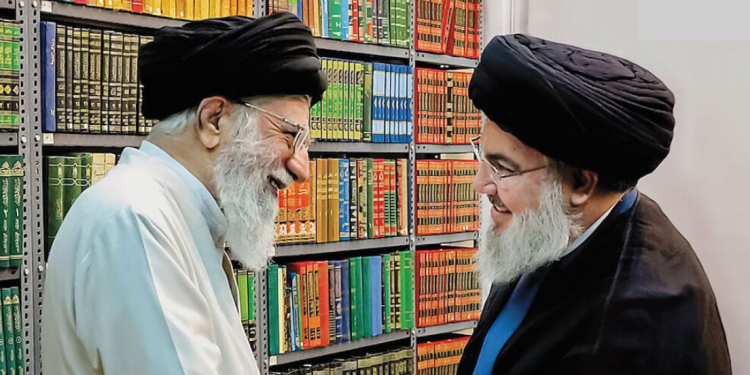"I remember in 1979 when the entire world was watching imam Khomenei in Paris. The hearts of tens of millions were with him when he boarded the plane to Tehran. In Iran, he received the largest welcome in history. It was a victory declaration."
Follow Israel Hayom on Facebook, Twitter, and Instagram
Thus Hassan Nasrallah, in an extravagant rush of nostalgia, began his television interview with Iranian propaganda station Al-Alam last week.
Thirty years have passed since Israel assassinated his predecessor, Abbas Musawi, on February 16, 1992. Ever since that day, the ayatollah regime in Tehran hasn't had a more prominent spokesperson. An accomplished orator able to captivate his admirers and enemies alike, he can rightly be viewed as the Arab voice of the Islamic republic.
From the moment the Iranians created Hezbollah in 1982, its leaders were subordinate to the will of Iran's supreme leader, Nasrallah not excluding. His blind obedience to the ayatollahs – which didn't crack even after the fall of thousands of Hezbollah fighters on Syrian battlefields, or after the assassination of Mustafa Badreddine – didn't preclude Nasrallah from denying in the interview the fundamental essence of the Shiite movement and wonder aloud when it had ever acted on Tehran's behalf. "These are things we will hear until elections. Old talk, a bunch of nonsense. Hezbollah comprises 100,000 fighters aside from the other institutions and frameworks, and has the support of the masses in Lebanon."
The choice to play innocent
Nasrallah's remarks caused a storm in Lebanon. Political figures were taken aback at the televised spectacle of Nasrallah playing innocent, particularly in light of the role Hezbollah plays in Syria, Iraq, Yemen, and even Bahrain.
Within this context, for example, the Saudi press recently reported on the assassination of a Hezbollah adviser in the war with the Houthis in Yemen, while in Bahrain, dozens of people were arrested in 2018 on suspicion of belonging to the organization.
Nasrallah's denial was meant to neutralize the scathing criticism he has faced amid the corruption and Lebanon's economic collapse, which has exacerbated tensions with the Sunnis and Christians in the country. After Hezbollah supporters were shot to death at a demonstration in October 2021, Lebanon's Christian leader, Samir Geagea, was accused of being responsible.
Just last month, former prime minister Saad Hariri, the leader of the al-Mustaqbal party, announced his resignation. The man who always makes a comeback blamed Iran for the crisis in Lebanon, and the belief is that his successor will be his brother Bahaa, who is hostile to Hezbollah and rejects cooperation with it.

In an article published last month by the Washington Institute for Near East Policy, the author, Hanin Ghaddar, posited that although opposition groups won't win enough mandates in parliament for a resounding victory, they could increase their strength by at least 10 more seats and finally put an end to the current majority currently enjoyed by Hezbollah and its allies. Ghaddar noted that Nasrallah's main ally, the Christian Free Patriotic Movement headed by President Michel Aoun, is plummeting in the poles to less than 13% support. She also noted that the lack of approval for Hezbollah is spreading, even among the Shiite public.
According to Ghaddar, Hezbollah and its allies are also worried about the spike in the number of Lebanese ex-pats who have registered to vote from abroad, most of them Christians living in the West. Amid this backdrop, the concern is that Nasrallah will try postponing the elections or torpedoing the formation of a government.
Insurance against attack
Dr. Shimon Shapira of the Jerusalem Center for Public Affairs believes Hezbollah will maintain its parliamentary strength in the May elections if the current alignment of political forces remains intact. Hezbollah, Shapira explains, wants to seize control of Lebanon through the parliament, through which the government is formed and the president is appointed. However, he does not believe Nasrallah will attempt to annul the constitutionally established allocations of power along ethnic lines; otherwise, the country will disintegrate into cantons and undercut his goal of controlling the entire country.
Subscribe to Israel Hayom's daily newsletter and never miss our top stories!
Beyond this Lebanese game of thrones, Nasrallah's commitment to Khamenei could be put to the test in the scenario of a future Israeli attack in Iran. Shapira emphasizes that Nasrallah also lied in the interview about Hezbollah's response to such an attack when he said the organization would convene and decide what to do based on the circumstances. "If Israel attacks nuclear sites in Iran – missiles will immediately be launched at Tel Aviv. They won't have to ask. Such a directive from Iran already exists. Moreover, Hezbollah's entire strategic missile arsenal, the whole precision missile project, is intended to deter Israel so it doesn't target the nuclear sites."
The cardinal blunder: The abduction
Shapira also disagrees with the perception that Nasrallah is a rational leader and perhaps even an "asset to Israel," especially considering his miserable decision that sparked the Second Lebanon War.
"Throughout his 30 years in power, Nasrallah hasn't made any cardinal mistakes, except for 2006. He abducted two IDF soldiers [reservists Ehud Goldwasser and Eldad Regev] and thought Israel wouldn't respond, in one of the most colossal errors of his time in power. So how do you explain that? Even as the supposed number one expert on Israel in the Arab world – look what a mistake he made in 2006. It's a mistake he's still paying for to this day. Since 2008, when Imad Mughniyeh was assassinated, he hasn't left his bunker."




